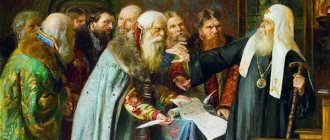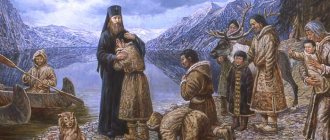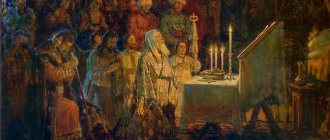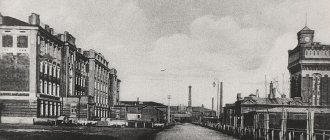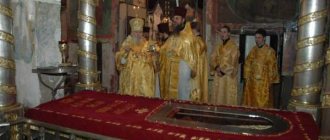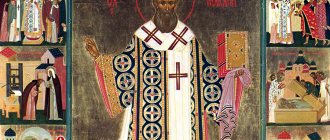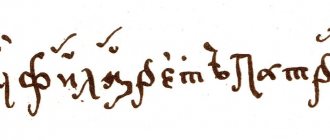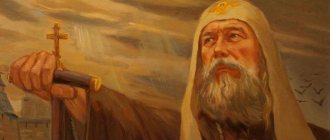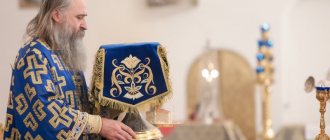Russian Orthodox Church
The future Patriarch Job (worldly name - Ivan (John)) came from the townspeople of the city of Staritsa, Tver province. Born in the second half of the 20s. XVI century.
He studied at the school at the Staritsky Assumption Monastery, where in the 1550s. was tonsured a monk with the name Job in honor of Job the Long-Suffering. Subsequently, he became the rector of the old monastery: on May 6, 1569, Tsar John IV Vasilyevich gave a letter of grant to Job as the archimandrite of the Assumption Monastery.
In 1571, Archimandrite Job was appointed rector of the Simonov New Moscow Monastery in honor of the Dormition of the Most Holy Theotokos. As the abbot of one of the most important monasteries of that time, he took part in the affairs of the Russian Church and state, and participated in church councils.
In 1575 he became archimandrite of the Novospassky Monastery in Moscow.
In 1581, Archimandrite Job was consecrated as Bishop of Kolomna, the service was led by Metropolitan Dionysius of Moscow.
From the mid-1580s. - close associate of Boris Godunov; in 1586 he was transferred to the Rostov archbishopric see, with the assistance of the tsar, by a council of bishops on December 11, 1586 he was elevated to metropolitan of Moscow.
In 1588, Patriarch of Constantinople Jeremiah II arrived in Moscow, during his visit the tsar again raised the issue of establishing the Patriarchate in Russia (Russian authorities began discussing this topic in the summer of 1586, during a visit to Moscow by Patriarch Joachim VI of Antioch). On January 26, 1589, with the participation of Patriarch Jeremiah II, Metropolitan Job was elevated to the Patriarchal throne.
The main goal of Patriarch Job’s activities was to strengthen Orthodoxy and the Russian Church in the country, and he took care to strengthen the discipline of the clergy. On the initiative of the saint, transformations were carried out, as a result of which the archdioceses were transformed into metropolises - Novgorod, Kazan, Rostov and Krutitsa; other dioceses became archbishoprics - Vologda, Suzdal, Smolensk, Ryazan, Tver; New dioceses were established, more than a dozen monasteries were founded. Patriarch Job used his personal funds and rich royal gifts for alms and the construction of churches.
Through the care of Patriarch Job, the printing of liturgical books, which were in short supply everywhere, was resumed, especially in the annexed lands - Kazan, Astrakhan, and Siberia. With the blessing of Saint Job, the Lenten Triodion, the Colored Triodion, the Octoechos, the General Menaion, the Official of the Bishop's Ministry and the Service Book were published for the first time. The saint also took some measures to correct existing inaccuracies in the liturgical books.
Under Patriarch Job, new Russian saints were glorified: Saint Basil the Blessed, Saint Joseph of Volokolamsk (the saint himself wrote a canon for him and “corrected the service”), Saints of Kazan Guriy and Barsanuphius, Right-Believing Prince Roman of Uglich, Saints Anthony the Roman and Cornelius, Blessed John of Moscow, Reverends Ignatius of Vologda and Martyry of Zelenetsky. For some saints already revered in Rus', new days of celebration were established.
Under Saint Job, missionary activity developed, aimed at strengthening the Orthodox faith in remote areas of the state (in Siberia, the Russian North), as well as in Georgia. With the blessing of the Patriarch, Orthodox missionaries revived churches and monasteries on the outskirts of Russia, several new monasteries were founded in the European part of the country, and the Donskoy Monastery was established in Moscow.
With the death of Tsar Theodore Ioannovich on January 7, 1598, the male line of the Rurik dynasty was cut short, and a period of state unrest began, known in Russian history as the Time of Troubles. In these difficult times, Saint Job was the first to lead the fight against the Polish-Lithuanian invaders, sending letters throughout the cities calling for the defense of the faith and the Fatherland. In January 1605, Patriarch Job anathematized False Dmitry I and the traitors who supported him.
On April 3, 1605, after the sudden death of Tsar Boris Godynov, a riot broke out in Moscow, the city was surrendered to the impostor and the Poles. Patriarch Job was deposed and exiled to the Assumption Staritsky Monastery, where the saint began his monastic journey.
After the overthrow of False Dmitry I and the accession of Vasily Ioannovich Shuisky on June 1, 1606, the saint was invited to return to the Patriarchal throne, but he refused, citing blindness and old age. Metropolitan Ermogen of Kazan was elected Patriarch. In February 1607, Patriarch Job was invited by Tsar Vasily Ioannovich, consecrated by the Council and all the “ranks” of Russian society to Moscow. On February 20, 1607, Patriarch Job and Patriarch Ermogen performed a divine service in the Assumption Cathedral of the Moscow Kremlin, the people asked them for forgiveness for violating the kiss of the cross to Tsar Theodore Borisovich Godunov and for recognizing the impostor. A letter of permission drawn up on behalf of the two High Hierarchs was read in the cathedral.
Patriarch Job died on June 19, 1607 and was buried at the western doors of the Assumption Cathedral of the Staritsky Monastery. Subsequently, a chapel was built over his grave.
In 1652, under Patriarch Joseph, the incorruptible relics of Saint Job were transferred to Moscow and placed next to the tomb of Patriarch Joasaph. With the blessing of His Holiness Patriarch Pimen and the Holy Synod, the name of Saint Job was included in the Council of Tver Saints; the first celebration of the Council of Tver Saints took place in July 1979. For all-Russian veneration, the saint was canonized at the Bishops' Council of the Russian Orthodox Church on October 7-14, 1989.
The memory of Saint Job, Patriarch of Moscow and All Russia, is celebrated by the Church on April 5/18 and June 19/July 2.
Patriarch of Moscow and All Rus'
His Holiness Patriarch of Moscow and All Rus' is the title of the primate of the Russian Orthodox Church. He is the ruling bishop of the Moscow diocese, and, in addition, in accordance with the charter of the Russian Orthodox Church, he has a number of church-wide powers within the local Russian Orthodox Church. The Patriarch has primacy of honor among the episcopate and is accountable to the Local and Bishops' Councils. He also takes care of the internal and external welfare of the Russian Orthodox Church and governs it together with the Holy Synod, being its Chairman. The external distinctive signs of patriarchal dignity are a white kukol, a green mantle, two panagias, a great paraman and a cross. The rank of Patriarch is for life.
Patriarchs of Moscow and All Rus'
Patriarchs of Moscow and All Rus'
Second Patriarchal period (1917 - present)
| Kirill | Gundyaev Vladimir Mikhailovich | February 1, 2009 | |
| Alexy II | Ridiger Alexey Mikhailovich | June 10, 1990 | December 5, 2008 |
| Pimen | Izvekov Sergey Mikhailovich | June 2, 1971 | May 3, 1990 |
| Alexy I | Simansky Sergey Vladimirovich | February 2, 1945 | April 17, 1970 |
| Sergius | Stragorodsky Ivan Nikolaevich | September 8, 1943 | May 15, 1944 |
| Tikhon | Bellavin Vasily Ivanovich | December 4, 1917 | April 7, 1925 |
First Patriarchal period (1589-1721)
After the death of Patriarch Hadrian, no successor was elected. In 1700-1721 the Guardian of the Patriarchal Throne was Metropolitan Stefan (Yavorsky) of Yaroslavl.
| Adrian | Andrey | 24 August 1690 | 16 October 1700 |
| Joachim | Savelov Ivan Petrovich | 26 July 1674 | March 17, 1690 |
| Pitirim | July 7, 1672 | April 19, 1673 | |
| Joasaph II | Novotorzhets | 10 February 1667 | 17 February 1672 |
| Nikon | Nikita Minin (Minov) | 25 July 1652 | 12 December 1666 |
| Joseph | Dyakov | 27 May 1642 | April 15, 1652 |
| Joasaph I | 6 February 1634 | November 28, 1640 | |
| Filaret | Romanov Fedor Nikitich | June 24, 1619 | 11 October 1633 |
| Saint Hermogenes | Ermolai | 3 June 1606 | 17 February 1612 |
| Ignatius | 30 June 1605 | May 1606 | |
| Saint Job | Ivan | January 23, 1589 | June 1605 |
On February 1, 2009, the enthronement of the newly elected head of the Russian Orthodox Church, the sixteenth Patriarch of Moscow and All Russia Kirill took place in the Cathedral of Christ the Savior in Moscow. The elevation to the patriarchal throne, performed during the Divine Liturgy, is an epoch-making event in the life of the entire Church, and therefore is always distinguished by special solemnity.
On January 27, 2009, Metropolitan Kirill of Smolensk and Kaliningrad was elected by the Local Council of the Russian Orthodox Church as the 16th Patriarch of Moscow and All Russia, gaining 508 votes out of 677, that is, 75%. Two days earlier, by the Bishops' Council of the Russian Orthodox Church in Moscow, held under his chairmanship, Metropolitan Kirill was elected one of three candidates for the Moscow Patriarchal throne: having received 97 votes out of 197 valid ballots.
On November 11, 1917, by the decision of the All-Russian Local Council, the Patriarchate was restored in Russia. Saint Tikhon, Metropolitan of Moscow, was elected the first Patriarch in the post-synodal period. Before the October Revolution, the Russian Church had the status of a state institution in the Russian Empire.
On January 25, 1721, Peter I finally abolished the patriarchate in Russia, with the consent of the Patriarchate of Constantinople, signing a manifesto on the establishment of the Theological College, which soon received the new name of the Holy Governing Synod. It was headed by the chief prosecutor - an official wholly accountable to the tsar.
On January 26, 1589, in the Assumption Cathedral of the Kremlin, with a huge crowd of people led by Tsar Theodore Ioannovich, Patriarch Jeremiah II of Constantinople performed the canonical installation of the first Russian Patriarch, Job.
On January 23, 1589, in Moscow, the Council, with the participation of the Patriarch of Constantinople Jeremiah, established the patriarchate in Russia. This decision was not only an affirmation and recognition of the independence of the Russian Orthodox Church, it was also a natural and deeply symbolic act of inheritance by the Russian land of the ecclesiastical significance and glory of ancient Byzantium, which fell under Ottoman rule.
First Patriarch
Saint Job
No matter what events took place in our Fatherland, the Russian Orthodox Church always remembered and prayed for its first Patriarch. By the Providence of God, on the eve of the upheavals of the Time of Troubles, our Church received Patriarchal leadership, which became an important milestone in its history and the history of the state. This historical event raised the authority of the Russian Orthodox Church to a qualitatively new level. From now on, Russia turned into an independent state both politically and churchly.
His Holiness Patriarch Kirill of Moscow and All Rus' spoke and wrote about his great predecessor several times. So, on July 2, 2012, on the day of remembrance of St. Job, he celebrated the Divine Liturgy in the Patriarchal Assumption Cathedral of the Moscow Kremlin. At the end of the service, the Primate of the Russian Church addressed the believers with a sermon:
“It was on the spot where I stand that my blessedly reposed holy predecessor, Saint Job, with his own hands took off his panagia and placed it in front of the Vladimir image of the Mother of God as a sign that he was leaving, but did not accept the conditions of the enemy, did not give the blessing of a foreign power, illegal and false. And the saint was sent to the Staritsky monastery, to the Tver land, where he was from, to the monastery from which his Patriarchate began. And when, after the overthrow of False Dmitry, the legitimate Patriarch Hermogenes was elected, whose relics also rest here, Saint Job did not want to return to Moscow, being a sick man and practically losing his sight.
This great example of St. Job helps us understand what difficult historical circumstances our Fatherland and our Church went through - flesh of the flesh and blood of the blood of its people, the soul and conscience of the people, which at the most fateful moments is called to testify to the truth of God, even if this the powers that be don’t like the truth. And Saint Job was not afraid to speak about the truth, although the majority of the boyars, the entire strength of Russian society, were against him. He stood firmly on the truth and, even being overthrown, went down in history as a holy saint of God.
Saint Job, even when the political situation in the country changed, when he could return to his ministry in Moscow and, relying on his Patriarchal authority, punish his offenders, did not do this. He remains in the Staritsky Monastery, he provides a place for the wrath of God.
And we know what happened to all the offenders of Saint Job, to all the seducers of our people, to those who brought unrest to the Russian state, trying to subjugate it to a different will and a different power.
The wrath of God poured out on everyone, and our people and our Church emerged from the shocks of the Time of Troubles even stronger. And we know that as a result of this victory over the Troubles, over human disorder, our people gained an internal spiritual impulse, which made it possible to repeatedly expand the borders of our Fatherland: both Siberia and later the Far East were annexed precisely as a result of God’s Providence and victory over enemies Rus' in the difficult Time of Troubles."
* * *
The future first His Holiness Patriarch of the Russian Orthodox Church, as we know from his life, bore the name John in the world. He came from the townspeople of the city of Staritsa, Tver province. His teenage years were spent in the Staritsky Assumption Monastery, where John received his initial education. Thanks to his monastic upbringing, the young man developed a desire to serve God in a monastic form.
In 1553, when John completed his studies at the monastery, his confessor, Archimandrite German, tonsured him as a monk.
“John deigned to depart from this vain world and take on the holy angelic form... And he was called a monk Job.”
Job spent more than 15 years in the Staritsa monastery, where, under the guidance of an experienced confessor, he cultivated selflessness and non-covetousness, obedience and abstinence, and learned heartfelt prayer and strict fasting. At the same time, the young monk was distinguished by deep humility, meekness and mercy. When Job became the rector of the Staritsa monastery, he inspired the brethren to spiritual work with his words and life.
In 1569, when Tsar Ivan the Terrible visited the Staritsa monastery, Job attracted his favorable attention. Soon he was elevated to the rank of archimandrite. Two years later, in 1571, Archimandrite Job was appointed abbot of the Simonov Monastery in Moscow, where he fulfilled the obedience entrusted to him with the same zeal.
In 1572 and in subsequent years, as the abbot of one of the most important monasteries of that time, Job participated in the Councils of the Russian Orthodox Church, and often in state affairs.
In 1575, Archimandrite Job headed another ancient Moscow monastery - the Novospassky Monastery. In 1581, Archimandrite Job was ordained Bishop of Kolomna. In 1586 he became Archbishop of Rostov the Great and in 1587 - Metropolitan of Moscow.
* * *
For six centuries since the Baptism of Rus' in the 10th century, the Russian Orthodox Church has been moving towards its complete independence. Before the establishment of the Patriarchate, our Church, which until the mid-15th century was a metropolis of the Patriarchate of Constantinople, was headed by metropolitans.
After the fall of Byzantium, the Moscow Metropolis gained ecclesiastical independence. Russia's importance as a powerful Christian power grew steadily.
“Orthodox Russia, under the control of its powerful Orthodox sovereigns,” writes Metropolitan Macarius in “History of the Russian Church,” “became the main representative and the only guardian and defender of Orthodoxy throughout the world - this is how the Russians themselves understood it, and all the Orthodox of the East looked at it in the same way. and the South, who groaned under the yoke of the Gentiles and sought in it for protection, help and consolation.”
***
The first of the Russian rulers who began to actively fight for the right of the Russian Orthodox Church to autocephaly was the son of Ivan the Terrible, Tsar Fyodor Ioannovich.
In 1586, he received Patriarch Joachim of Antioch in Moscow, and he supported his idea. Moreover, Joachim agreed to become a kind of mediator in negotiations on this issue with the Patriarchate of Constantinople and the heads of other Local Churches.
And in 1588, following the Patriarch of Antioch Joachim, the Ecumenical Patriarch Jeremiah II himself came to Russia. He agrees to provide the long-awaited independence - to establish the Moscow Patriarchal Throne.
On February 2 (January 23), 1589, in the Assumption Cathedral of the Kremlin, in the Pokhvalsky chapel, the traditional place for the election of candidates for metropolitan, in the presence of the Patriarch of Constantinople and members of the Consecrated Council, the election of candidates for the Patriarchate was carried out. Then all those participating in the elections arrived at the palace, where Jeremiah II presented three candidates to Tsar Fyodor Ioannovich: Metropolitan Job of Moscow and All Rus', Archbishop Alexander of Novgorod and Archbishop of Rostov Varlaam.
The final choice of the sovereign fell on Job. Here, in the royal chambers, he was named Patriarch.
The solemn ceremony of enthronement of the first His Holiness Patriarch of Moscow and All Rus' with a large gathering of people took place three days later. On January 26 / February 5, 1589, Patriarch Jeremiah II of Constantinople with a host of bishops enthroned His Holiness Job.
“After the Liturgy, during which the dedication took place, Jeremiah,” Archimandrite Joseph describes this historical event in the book “Brief information about the All-Russian Patriarchs,” “handed the newly installed Patriarch a staff, and the king placed a panagia and a precious hood on him.”
Before leaving Moscow, Patriarch Jeremiah left a “Laid-out Letter” signed by him and the clergy accompanying him, confirming the fact of the establishment of the Patriarchate in Russia. This charter also consolidated the formula of the “Third Rome” and, in particular, read:
“Before old Rome fell through the Apolinarian heresy; the second Rome, this is Constantinople, we have the Hagarian grandsons, from the godless Turks; yours, O pious Tsar, the great Russian Kingdom, the third Rome, surpasses all in piety, and the whole pious kingdom is gathered into yours, and you are the only Christian King under heaven who is called throughout the entire universe, in all Christians, and by your royal request from God , by your royal advice, this great deed has been fulfilled. And by the grace of the Holy and Life-Giving Spirit, and by the will of the pious great Sovereign Tsar and Grand Duke Theodore Ioannovich... Most Holy Eremey, by God's grace, Archbishop of Constantinople, New Rome, and the Ecumenical Patriarch, according to the rules of the Divine Apostle and Saints Father... elected and installed as Patriarch... Job the Most Reverend, Metropolitan of All Russia."
What followed was a wave of recognition of sorts. The fateful decision for the Russian Orthodox Church was confirmed by the Patriarchs of all Churches of the Eastern Rite at the Councils of Constantinople in 1590 and 1593. The decisions of the Councils established that Patriarchal rights in Russia are assigned to His Holiness Patriarch Job and to all his successors “for all eternity.”
In addition, the Primate of the Russian Orthodox Church received fifth place after the heads of the thrones of Constantinople, Alexandria, Antioch and Jerusalem. This is due to the comparative youth of our Church. However, in size, influence and global significance, she already took precedence in the Orthodox world, which, in particular, was expressed in her patronage of the Eastern Patriarchs.
***
The main goal of all the activities of His Holiness Patriarch Job is the increase in the spiritual power of the Russian Orthodox Church, the strengthening of Orthodoxy in Russia, the spread of Christianity in the Volga region, conquered under Ivan the Terrible, and in Siberia, annexed during the reign of Boris Godunov, whose close associate the saint became from the mid-1580s. x years. And in the future, Patriarch Job always supported Boris’s policies.
On the initiative of His Holiness Patriarch Job, transformations were carried out: four metropolises were included in the Moscow Patriarchate: Novgorod, Kazan, Rostov and Krutitsa; New dioceses were established, more than a dozen monasteries were founded.
Among the important church events of his Patriarchate are the canonization of St. Basil and Joseph of Volotsk, Blessed John of Moscow, Saints of Kazan Guria and Barsanuphius, Right-Believing Prince Roman of Uglich, Saints Anthony of Rome and Cornelius, Ignatius of Vologda and Martyrion of Zelenets.
In 1591, the relics of St. Philip of Moscow were transferred from the Tver Otroch Monastery to Solovki, and a celebration was established for him.
The saint was tirelessly engaged in the spiritual enlightenment of the people. There was a shortage of liturgical books everywhere, especially in Kazan, Astrakhan, and Siberia. His Holiness Patriarch Job was the first to put the work of printing on a broad basis - the dissemination of the Holy Scriptures and patristic books.
***
In 1598, Tsar Feodor Ioannovich died, ending the male line of the Rurik dynasty. A period of state unrest began, known in Russian history as the Time of Troubles.
During this tragic period, the High Hierarch and prayer book for the entire Russian people, His Holiness Patriarch Job, who was actually the first to lead the opposition to the Polish-Lithuanian invaders, retained true Christian patience, fearlessness and courage. Both in oral sermons and in special Patriarchal messages with a call for the defense of the faith and the Fatherland, which he sent to all dioceses, Patriarch Job fearlessly denounced the destroyers of the state order, who brought disorder into the Church of God, denounced False Dmitry as an impostor, the defrocked deacon Grigory Otrepiev.
He cited evidence of the authenticity of the death of Tsarevich Dimitri, pointing out that King Sigismund was using an impostor to trample on the Orthodox faith in Rus'. In January 1605, Patriarch Job anathematized False Dmitry I and the traitors who supported him. The letters of His Holiness the Patriarch sobered up many sensible people. However, the forces for the fight were unequal. False Dmitry, who managed to enlist the support of Poland and the Vatican, promising to introduce a union in Russia, entered the borders of our country with a considerable army and quickly advanced towards Moscow.
On April 13, 1605, after the sudden “death,” as the official version said, of Tsar Boris Godunov (in fact, murder - according to the testimony of a number of contemporaries!), a riot broke out in Moscow. The Russian capital was surrendered to the impostor and the Poles. His Holiness Patriarch Job, who refused to swear allegiance to False Dmitry, was deposed. False Dmitry appointed Archbishop Ignatius, a Greek by nationality, to the “Russian” Patriarchate. Exhausted, having endured much reproach, Saint Job, in a simple black cassock, was exiled to the Staritsky Monastery, where he had once begun his monastic feat. He lost his sight, but spent all his time in prayer.
On May 17, 1606, the boyar party of Vasily Shuisky rebelled in Moscow. False Dmitry was killed. His corpse lay on Red Square for several days, then was burned. The impostor's ashes were loaded into a cannon, firing in the direction from which it came.
On May 25, 1606, Vasily Shuisky became king. He asked the legitimate His Holiness Patriarch Job to return to the First Hierarchal throne. But Saint Job, due to weakness, could no longer bear the heavy cross of such service. In his place, he blessed Metropolitan Hermogenes (Hermogenes) of Kazan.
* * *
On June 19, 1607, His Holiness Patriarch Job died peacefully. He was buried at the western doors of the Assumption Cathedral of the Staritsky Monastery. Subsequently, a chapel was built over his grave.
On April 5/18, 1652, under His Holiness Patriarch Joseph, the incorrupt and fragrant relics of Saint Job were transferred to Moscow and placed next to the tomb of His Holiness Patriarch Joasaph. Many healings occurred from the relics of Saint Job.
...More than three centuries have passed. With the blessing of His Holiness Patriarch Pimen and the Holy Synod, the name of St. Job was included in the number of the Council of Tver Saints. The first celebration of the Council of Tver Saints took place in July 1979.
For All-Russian veneration, Saint Job was canonized at the Bishops' Council of the Russian Orthodox Church on October 7–14, 1989.
Material prepared by Nikolay Golovkin
